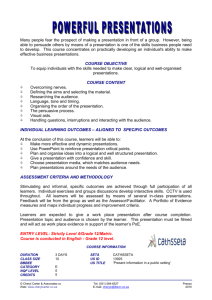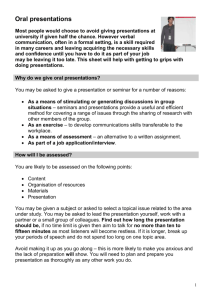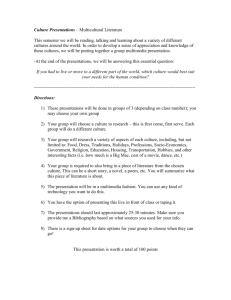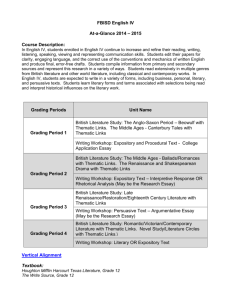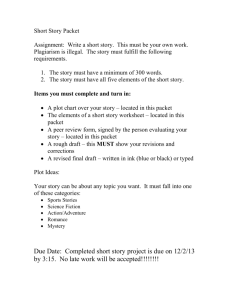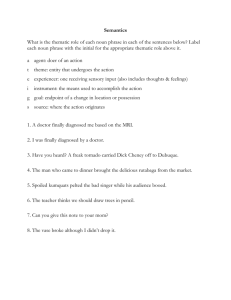AP Syllabus - Keansburg School District
advertisement
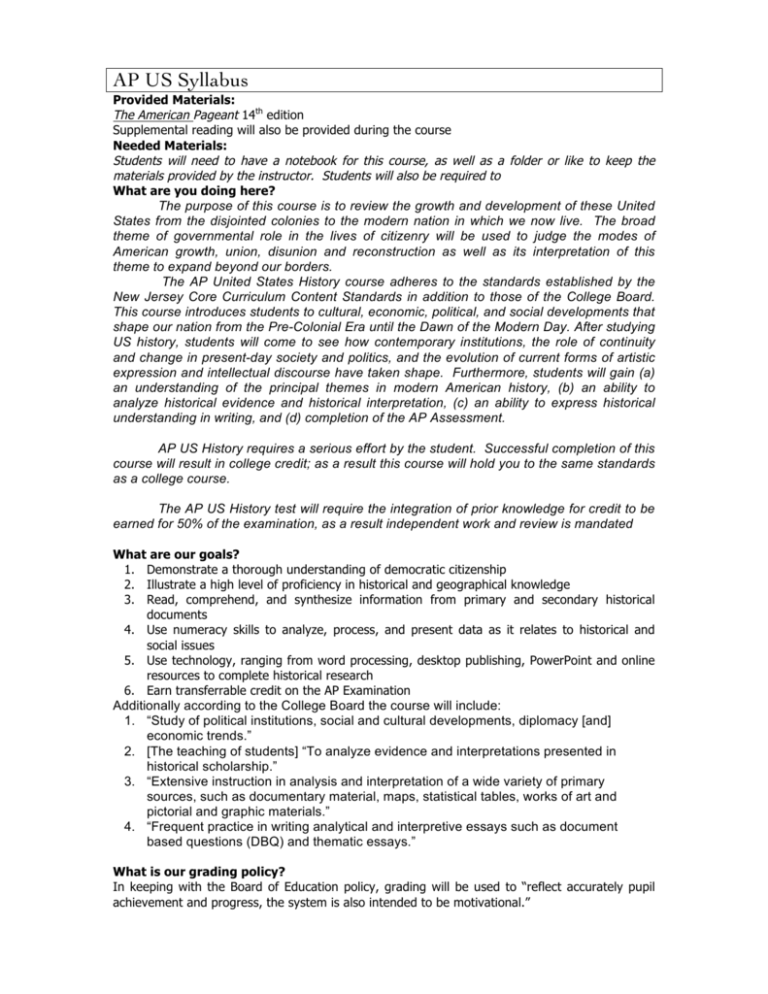
AP US Syllabus Provided Materials: The American Pageant 14th edition Supplemental reading will also be provided during the course Needed Materials: Students will need to have a notebook for this course, as well as a folder or like to keep the materials provided by the instructor. Students will also be required to What are you doing here? The purpose of this course is to review the growth and development of these United States from the disjointed colonies to the modern nation in which we now live. The broad theme of governmental role in the lives of citizenry will be used to judge the modes of American growth, union, disunion and reconstruction as well as its interpretation of this theme to expand beyond our borders. The AP United States History course adheres to the standards established by the New Jersey Core Curriculum Content Standards in addition to those of the College Board. This course introduces students to cultural, economic, political, and social developments that shape our nation from the Pre-Colonial Era until the Dawn of the Modern Day. After studying US history, students will come to see how contemporary institutions, the role of continuity and change in present-day society and politics, and the evolution of current forms of artistic expression and intellectual discourse have taken shape. Furthermore, students will gain (a) an understanding of the principal themes in modern American history, (b) an ability to analyze historical evidence and historical interpretation, (c) an ability to express historical understanding in writing, and (d) completion of the AP Assessment. AP US History requires a serious effort by the student. Successful completion of this course will result in college credit; as a result this course will hold you to the same standards as a college course. The AP US History test will require the integration of prior knowledge for credit to be earned for 50% of the examination, as a result independent work and review is mandated What are our goals? 1. Demonstrate a thorough understanding of democratic citizenship 2. Illustrate a high level of proficiency in historical and geographical knowledge 3. Read, comprehend, and synthesize information from primary and secondary historical documents 4. Use numeracy skills to analyze, process, and present data as it relates to historical and social issues 5. Use technology, ranging from word processing, desktop publishing, PowerPoint and online resources to complete historical research 6. Earn transferrable credit on the AP Examination Additionally according to the College Board the course will include: 1. “Study of political institutions, social and cultural developments, diplomacy [and] economic trends.” 2. [The teaching of students] “To analyze evidence and interpretations presented in historical scholarship.” 3. “Extensive instruction in analysis and interpretation of a wide variety of primary sources, such as documentary material, maps, statistical tables, works of art and pictorial and graphic materials.” 4. “Frequent practice in writing analytical and interpretive essays such as document based questions (DBQ) and thematic essays.” What is our grading policy? In keeping with the Board of Education policy, grading will be used to “reflect accurately pupil achievement and progress, the system is also intended to be motivational.” A formal grade matrix will be provided in keeping with the new school standards and levels of performance Grading values will change during the course of this class, becoming increasingly more difficult as the course progresses What are our Grading Weights? Your grade will be calculated with the following values Tests will account for 40% of your total grade, projects will be valued as 2 tests Classwork will account for 30% of your total grade Quizzes will account for 20% of your total grade Homework will account for 10% of your total grade What is our Homework Policy? Homework is a tool and a valuable component of this course. It is not a punishment but an integral part of your achievement; it introduces, reinforces or reviews class materials. Homework will always be graded for completion in addition to content; as a result there will be times where the assignment will appear in more than one column. Homework will account for 10% of your total class grade Assignments are due on the date indicated, lateness will result in a deduction of 1/10th total value a day, after 5 days the assignment will be valued at one half, work submitted after that date will not be penalized beyond that level. What are the rules of my classroom? All school rules are in effect in the classroom setting and will be adhered to. The following are of noted importance, yet any rule may change given the dictates of situation and atmosphere. • Bring all necessary materials to every class, they are mine to distribute, not protect • Your input is always welcome, provided it is on or around topic • By law, Criminal Code 2C:33-19, no electronic equipment is permitted in school BOE policy #5516 dictates that these materials be confiscated. No Question, No Warning. • No outwardly violent or discriminatory behavior toward another student or myself will be tolerated. • There will be no cheating, this class does not necessitate cheating • Plagiarism is frowned upon, to the point of failure. If a project or written report is found to be plagiarized, it will be dealt with through dictated channels. • Tardy policy is in keeping with the school mandates, of a single warning followed by teacher detention for second offenses as well as parental contact. After 5 tardies have been achieved, students will be referred to administration Advanced Placement Exam: The AP Exam is given in May. The Exam is three hours and 5 minutes long. Exam Format: • 80 Multiple Choice Questions (55 minutes) • Free Response Essay Section (130 minutes) • Document Based Question (60 minutes) o Reading and Analysis (15 minutes) o Write Essay (45 minutes) • Essay Questions – answering 2 of 4 (70 Minutes) Themes in AP US History American Diversity The diversity of the American people and the relationships among different groups. The roles of race, class, ethnicity, and gender in the history of the United States. American Identity Views of the American national character and ideas about American exceptionalism. Recognizing regional differences within the context of what it means to be an American. Culture Diverse individual and collective expressions through literature, art, philosophy, music, theater, and film throughout U.S. History. Popular culture and the dimensions of cultural conflict within American society. Demographic Changes Changes in birth, marriage, and death rates; life expectancy and family patterns; population size and density. The economic, social, and political effects of immigration, internal migration, and migration networks. Economic Transformations Changes in trade, commerce, and technology across time. The effects of capitalist development, labor and unions, and consumerism. American Diversity The diversity of the American people and the relationships among different groups. The roles of race, class, ethnicity, and gender in the history of the United States. American Identity Views of the American national character and ideas about American exceptionalism. Recognizing regional differences within the context of what it means to be an American. Culture Diverse individual and collective expressions through literature, art, philosophy, music, theater, and film throughout U.S. History. Popular culture and the dimensions of cultural conflict within American society. Demographic Changes Changes in birth, marriage, and death rates; life expectancy and family patterns; population size and density. The economic, social, and political effects of immigration, internal migration, and migration networks. Economic Transformations Changes in trade, commerce, and technology across time. The effects of capitalist development, labor and unions, and consumerism. Environment Ideas about the consumption and conservation of natural resources. The impact of population growth, industrialization, pollution, and urban and suburban expansion. Globalization Engagement with the rest of the world from the fifteenth century to the present: colonialism, mercantilism, global hegemony, and development of markets, imperialism, and cultural exchange. Politics and Citizenship Colonial and revolutionary legacies, American political traditions, growth of democracy, and the development of the modern state. Defining citizenship; struggles for civil rights. Reform Diverse movements focusing on a broad range of issues, including anti-slavery, education, labor, temperance, women’s rights, civil rights, gay rights, war, public health, and government. Religion The variety of religious beliefs and practices in America from prehistory to the twenty-first century; influence of religion on politics, economics, and society. Slavery and Its Legacies in North America Systems of slave labor and other forms of un-free labor (e.g., indentured servitude, contract labor) in American Indian societies, the Atlantic World, and the American South and West. The economics of slavery and its racial dimensions. Patterns of resistance and the long-term economic, political, and social effects of slavery. War and Diplomacy Armed conflict from the pre-colonial period to the twenty-first century; impact of war on American foreign policy and on politics, economy, and society. Units of Study This course will cover the following materials. All dates are flexible as a result of instructional necessity and environmental influences. The course will assuredly cover all indicated materials by the May AP Assessment date. Following that date students will work on individualized research activities. Unit 1: DISCOVERY AND COLONIZATION TO 1763 In this unit learners will be expected to recognize the factors that resulted in exploration and colonization as well as the interrelations between the mother countries and their fledgling nations that resulted in the difficulties of social ties resulting in the division and independence of the nation. International political influence and reaction thereof will be our means of utilizing full course thematic correlation. DURATION: 2 weeks • CHAPTERS 1-5 The American Pageant • Primary Reading/ Literature Seminar – Euphimia by Charlotte Lennox (excerpts) • Chapter Packet/Thematic Presentations: Chapters 1-5 • COMMON QUESTIONS TEST#1 • DBQ #1 Unit 2: REVOLUTION! 1763-1783 In this unit learners will be expected to explore the events of the American Revolution, its sociopolitical impact as well as the rationale for the termination of hostilities. The role of government in the lives of colonists and its ramifications will maintain our thematic umbrella. DURATION: 1.5 weeks • CHAPTERS 6-8 The American Pageant • Primary Reading/ Literature Seminar – Common Sense by Thomas Paine • Primary Reading – The American Declaration of Independence by Thomas Jefferson • Primary Reading –Treatise on Government by John Locke • Chapter Packet/Thematic Presentations: Chapter 6 • COMMON QUESTIONS TEST #2 • DBQ #2 • Chapter Packet/Thematic Presentations: Chapter 8 Unit 3: BIRTH OF A NATION: 1776-1824 In this unit learners will be expected to navigate the tremulous seas of the fledgling nation. The efforts to consolidate power and find direction as well as the internal and international relations that propelled the nation toward a more perfect union. The growth of the American Supreme Court and its expressions of power will be analyzed. Americans will question the needs of and role of our new government, in keeping with our annual theme. • • • • • • • DURATION: 3.5 weeks CHAPTERS 9-12 The American Pageant Primary Reading – The Federalist Papers #10 COMMON QUESTIONS TEST #3 DBQ #3 Chapter Packet/Thematic Presentations: Chapter 9 Chapter Packet/Thematic Presentations: Chapters 10-11 Chapter Packet/Thematic Presentations: Chapter 12 Unit 4: ANTEBELLUM AMERICA 1824-1860 In this unit learners will be expected to judge the effectiveness of legislation and operation in a diversifying nation riddled with internal struggles for power, economic direction, and a balance of rights and needs. The cultural divergence of the nation as well as the effectiveness and attempted expression of power of the legislative components of the national government will be of special interest. Again we will look toward governmental influence on individual rights and privileges as they have developed in the nation. DURATION: 3 weeks • CHAPTERS 13-15 The American Pageant • Primary Reading/ Literature Seminar – Uncle Tom’s Cabin by Harriet Beecher Stowe (excerpts) • Chapter Packet/Thematic Presentations: Chapter 13 • COMMON QUESTIONS TEST #4 • DBQ #4 • Chapter Packet/Thematic Presentations: Chapter 14 • Chapter Packet/Thematic Presentations: Chapter 15 Unit 5: THE FRACTURED NATION 1820-1861 In this unit learners will be expected to trace the social changes of the nation and assess the roles of these factors in the divergence in national identities that resulted in the fracturing of the nation. Societal changes and movements will be a point of special focus. Again we will look toward governmental influence on individual rights and privileges as they have developed in the nation. • • • • • DURATION: 3 weeks CHAPTERS 16-19 The American Pageant Chapter Packet/Thematic Presentations: Chapters 16-17 COMMON QUESTIONS TEST #5 DBQ #5 Chapter Packet/Thematic Presentations: Chapters 18-19 Unit 6: I DON’T NEED YOUR CIVIL W AR! 1861-1877 In this unit learners will be expected to evaluate American procedures and actions, both military and diplomatic, during the American Civil War. The culmination of the divergent ideas on government’s role will come to a head in this unit. DURATION: 2 weeks • CHAPTERS 20-22 The American Pageant • Primary Reading/ Literature Seminar – Red Badge of Courage by Stephen Crane (excerpts) • Chapter Packet/Thematic Presentations: Chapter 20 • Chapter Packet/Thematic Presentations: Chapters 21-22 • Reconstruction Proposals Presentation and Debate MIDTERM ASSESSMENT – FULL SAMPLE AP ASSESSMENT (benchmarking non-covered content) Unit 7: TRANSITIONAL NATION 1865-1899 In this unit learners will be expected to evaluate the nation’s efforts to realign following the American Civil War. Domestic and foreign policy and the change of Americanism will be analyzed as will the economic growth and redirection of the nation. America prepares to create a new understanding of the role of government in the life of the individual. DURATION: 3 weeks • CHAPTERS 23-26 The American Pageant • Primary Reading/ Literature Seminar – Bury My Heart at Wounded Knee by Dee Brown (excerpts) • Primary Reading/ Literature Seminar – The Turner Thesis by Fredrick Jackson Turner (abridged) • MANIFEST DESTINY PROJECT • Chapter Review Activity Questions: Chapter 23 • Chapter 24 or 25 Partner Presentations • Chapter Review Activity Questions: Chapter 26 Unit 8: EXPANSION, PROGRESSIVISM AND THE GREAT W AR 1899-1929 In this unit learners will be defend the role of progressive legislation and legislators upon the lives of Americans as well as the expansion of the nation’s international policy as a force in the global environment. Our new definition now forces us to look outward to ensure the protection of our own interests. DURATION: 4 weeks • CHAPTERS 27-31 The American Pageant • Primary Reading/ Literature Seminar – Maggie a Girl of the Streets by Stephen Crane (abridged) • Chapter Packet/Thematic Presentations: Chapter 27 • Chapter Packet/Thematic Presentations: Chapter 28 • COMMON QUESTIONS TEST #6 • DBQ #6 • Chapter Packet/Thematic Presentations: Chapter 29 • Chapter Packet/Thematic Presentations: Chapter 30 • Chapter Packet/Thematic Presentations: Chapter 31 Unit 9: DISILLUSIONMENT, DEPRESSION, AND MORE W AR 1920-1945 In this unit learners will be expected to measure the effectiveness of the post WWI American spirit, the sense of increased worth and loss of direction. The materialism and economic boom following the war and the resultant economic repercussions, the impact of governmental actions to address the issues and the transition of this environment into a global crisis and full blow international action will all be analyzed. The truest test of a nation is its standing in the face of adversity, and its request by its peoples to help while maintaining its own ideas of what it needs to do in the lives of its populace. DURATION: 3 weeks • CHAPTERS 32-35 The American Pageant • Primary Reading/ Literature Seminar – The Grapes of Wrath by John Steinbeck (excerpts) • Chapter Packet/Thematic Presentations: Chapter 32 • COMMON QUESTIONS TEST #7 • DBQ #7 • Chapter Packet/Thematic Presentations: Chapters 33-34 • Chapter Packet/Thematic Presentations: Chapter 35 Unit 10: COLD W AR FEARS AND CULTURAL CHANGE 1945-1960 In this unit learners will be expected to appraise the US reaction to the growth of communism following the Second World War, the altered international role of the nation and the change in domestic policy that was facilitated by these changes. Protecting our domestic ideals will be redefined to necessitate take in role which we once opposed DURATION: 3 weeks • CHAPTERS 36-37 The American Pageant • Primary Reading/ Literature Seminar – The Mouse that Roared by Leonard Wibberley (excerpts) • Chapter Packet/Thematic Presentations: Chapter 36 • Chapter Packet/Thematic Presentations: Chapter 37 Unit 11: LIBERALISM AND CONSERVATIVE RESPONSE: 19602000+ In this unit learners will be expected to justify the contraction of American goals in reaction to the international reaction of the nation. The shift of domestic policy due to the alteration of American ideology as well as the foreign policy of the United States in light of the effectiveness of alternate international responses will be discussed and synthesized. What is the role of government in your life today, and how has it changed? • • • • • • CHAPTERS 38-42 The American Pageant Primary Reading/ Literature Seminar – Unsafe at Any Speed by Ralph Nader Chapter Review Activity Questions: Chapter 38 Chapter Review Activity Questions: Chapter 39 Chapter Review Activity Questions: Chapter 40 Chapter Review Activity Questions: Chapter 41 AP ASSESSMENT PREP More details to follow as the date approaches AP US History Student and Parent/Guardian Responsibilities: Student: I agree to take full responsibility • to show a commitment to academic excellence. • to attend class regularly. • to do my own work in order to improve my ability to reason, analyze, and understand. • to organize my time and study habits to complete successfully the above named AP course. • to take the AP exam in May for this course. • to confer with the teacher and take immediate action if I begin to fall behind in the course. Parent/Guardian • I agree to be familiar with the above AP course requirements • I agree to help my son/daughter organize study time in support of class assignments. • I agree to encourage him/her to communicate with the teacher when discipline or curricular questions or concerns arise. If the situation remains unresolved, I will request an appointment with the teacher. I understand that the coursework for AP classes is stringent and that outside study for each class can amount to one to two times actual school class time. ACKNOWLEDGEMENT FORM I have read the attached syllabus, including the classroom rules, course guidelines, homework and grading policy and AP Contract and have discussed all materials with my child Student Name (Please Print) LAST GRADE STUDENT SIGNATURE PARENT SIGNATURE FIRST

